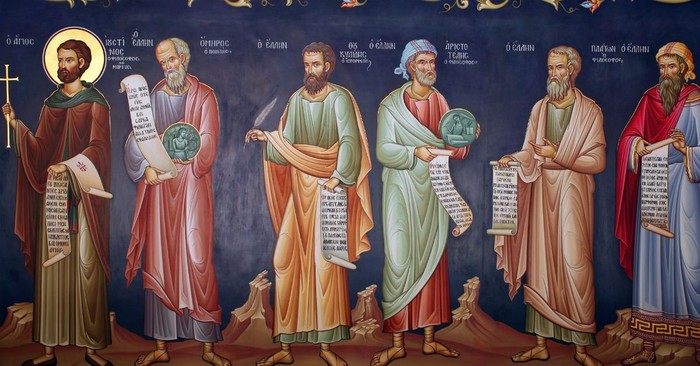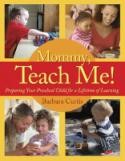Why Celebrate All Saints' Day? A Parent’s Perspective on the Benefits
- Barbara Curtis Crosswalk.com Contributor
- Updated Oct 24, 2023

Maybe it's my background as a teacher. Or maybe just because I've been raising children for 39 years (with a few addendums through adoption) - but no matter how academic or ethereal the subject, I tend to look at it through children's eyes.
I make no apology for this. I will admit it's not often the most respected point of view. But I hope God is pleased by this approach to the big theological questions. After all, he said "Unless you become as a little child. . . ." Sometimes that's not so easy for grownups. But sometimes it can help us see the simple truth about a complex subject.
Since becoming Christians in 1987, our family has pretty much ignored the last day of October - except for Halloween 1990 following our flight from a legalistic church when we celebrated our newly-realized freedom in Christ at the expense of my limited seamstress skills: four knights-in-shining-armor and one fair damsel costume traipsing the neighborhood, looking for treats.
Then, comfortable that our decisions about extra-biblical issues were our own to make, we promptly dropped Halloween from our family traditions - opting instead to cozy up with the lights off for popcorn and a movie.
Parish hall harvest festivals never appealed to me. Their effort to replace a secular holiday begged the question whether something was missing. Nothing missing at all, I thought.
But now I think there was. The empty spot belongs to a longstanding, but often ignored, Christian feast day: All Saints' Day.
Last month I remembered a hymn I learned in sixth grade (Virginia public schools circa 1958) and thanks to the Mighty Internet, found the lyrics the same fifty years later:
I Sing a Song of the Saints of God
I sing a song of the saints of God,
Patient and brave and true,
Who toiled and fought and lived and died
For the Lord they loved and knew,
And one was a doctor,
And one was a queen,
And one was a shepherdess on the green:
They were all of them saints of God--and I mean,
God helping, to be one too.
They loved their Lord so dear, so dear,
And his love made them strong;
And they followed the right, for Jesus' sake,
The whole of their good lives long.
And one was a soldier,
And one was a priest,
And one was slain by a fierce wild beast:
And there's not any reason--no, not the least,
Why I shouldn't be one too.
They lived not only in ages past,
There are hundreds of thousands still,
The world is bright with the joyous saints
Who love to do Jesus' will.
You can meet them in school, or
In lanes, or at sea,
In church, or in trains, or in shops, or at tea,
For the saints of God are just folk like me,
And I mean to be one too.
What I most appreciated was that whoever wrote this hymn, obviously, was able to see the world through a child's eyes. The simplicity, humility and yearning resonate with the little girl in me, the part that will never grow old in relation to my Heavenly Father. I found tears in my eyes as I sang the words again, now with the adult knowledge of the price that these saints - many of them everyday people - had eventually paid for their faith and obedience.
Lesbia Scott, who wrote this hymn in 1929, was certainly an everyday person - a mother who produced songs to meet her children's requests: "Write us a song about a foggy day," or "Make us a hymn about a picnic."
One year, as the Feast of All Saints (November 1) approached, she decided to write a song that would inspire her children and "impress on them the fact that sainthood is a living possibility today."
Never intended for publication, nonetheless "I Sing a Song" was eventually included in the Anglican Hymnal. No one could have been more surprised than Mrs. Scott when it was eventually included in the Hymnbook for the Armed Forces. Her reaction:
"I confess to a certain amount of glee in picturing a choir of Sergeant-Majors singing the words I wrote for my nurseryful of innocent babes."
Mrs. Scott was on to something. And those wondering about the reality or relevancy of the saints may benefit from a paradigm shift.
Yes, I'm speaking of Saints with a capital "S." You know, the ones that some churches have statues of - just as parks have statues of Generals Gone-to-Glory. The ones we're not supposed to worship. The ones that some would argue were part of the baby-thrown-out-with-the-bathwater by those churches nervous about making idols.
And here's what I've been thinking:
That God built something in us that made us need someone to look up to. Of course, we look up to Jesus - in worship and prayer. But He is divine and we are not. God also established in each of us a need for heroes and role models who started as everyday sinners like us.
We can see how that unmet need causes problems in contemporary Christianity. How many "stars" fill the evangelical firmament? Stars so prone to falling. How disappointing - even devastating - it has been to Christians when a swaggering preacher man is revealed to be living a double life, telling us all how to flee from sin while unable to escape it himself.
But what of the saints? They were never super stars. They lived quiet lives of devotion to God and service to others. Some were used by God to perform miracles - claims given due process by the Catholic Church but often scorned by denominations who nevertheless claim wonder-working power in their own churches or on TV.
Elisabeth Elliot has written: "Reading the biographies of men and women whose hearts were gladly given to God has lit the way for me. Seeing the obedience of just one simple Christian has more than once steered me clear of danger."
The stories of saints light the way for those of us still finding our way through the valley of the shadow. Their lives point us directly to the heart of God.
When our earthly heroes fall, Satan whispers to us that we cannot rise above our sin, that we are sure to fail as well. He can't say that about the Saints gone before us who have already been tested. They are still our brothers and sisters but they are in a place where they are no longer subject to temptation, can no longer fall. Meditating on and emulating their lives is not worship. It's smart.
When I see pictures and statues of saints and read their stories, I am reminded of the virtues, devotion and sacrifice that help me see the work I do through the eyes of God: unseen by others, menial and unimportant, yet ennobled when it is humbly offered to God. I am reminded of the courage possible under persecution when I offer my suffering to God.
Are the saints a distraction from the Word of God? Or does God use their lives to write His lessons more clearly in our hearts?
I'm thinking the latter. And I'm thinking that for the sake of children - who lack the ability to think abstractly - the way to teach spiritual virtues is through those whose lives exemplified them. And I'm thinking like Mrs. Scott, I don't want to miss this opportunity to write these virtues on my children's hearts.
Before Christian cartoons set about teaching virtues, God gave us real life examples of individuals who loved him beyond all human understanding.
Can a believer live a godly life without the saints? Of course. But why should we have to?
Originally posted on October 23, 2008
Resources for Parents:
131 Christians Everyone Should Know by Mark Galli and Ted Olson, B&H Publishing Group
Loyola Kids Book of Saints by Amy Welborn and Ansgar Holmberg (Loyola Press, September 2001).
Barbara Curtis has 12 children - including three adopted sons with Down syndrome - and 10 grandchildren so far. She is also an award-winning author with nine books and 800+ articles in print publications including Focus on the Family, Guideposts, Christian Parenting Today, and The Washington Times.
Barbara is a popular speaker at MOPS and women's events, as well as writers' conferences. Online you can find her at MommyLife and Mommy, Teach Me!.
Original publication date: October 23, 2008




















